The 2018 Christmas party held by the Transport Salaried Staffs’ Association was, according to at least one who was there, a rather boozy affair. After dinner, washed down with plenty of drinks, partygoers decamped to a nearby pub.
There, alas, the festive atmosphere swiftly soured when the trade union’s firebrand General Secretary, Manuel Cortes, allegedly made a drunken attempt to kiss one of his female members of staff, former casino waitress Claire Laycock.
Fast forward three-and-a-half years and highly damaging claims about what happened that night — not to mention during the months that followed — have led to calls for the resignation of 55-year-old Cortes, along with a cultural shake-up of the entire British trade union movement.
Indeed, while Cortes is gleefully preparing to wage war on the rail industry this summer, with threats of mass walkouts and ‘maximum possible disruption’ amid ongoing pay disputes, it appears that his former colleagues have now turned the tables and declared their own war on him.
Ms Laycock, 45, who worked as a TSSA organiser for several years, is one of seven women to have come forward with sexual harassment claims, all pointing the finger at militant Labour supporter Cortes.
The complainants, who are all former TSSA staff members, are being backed by campaigners using the banner #MeTU and calling for sexism, harassment and bullying to be stamped out. Campaigners were out in force this Wednesday, protesting with placards outside the TUC offices in London.
Seven women have made claims of harassment against TSSA general secretary Manuel Cortes
Cortes, who left school in Gibraltar aged 15 with no qualifications, vehemently denies harassment and has apologised for any hurt caused by his behaviour. But the TSSA, which represents white-collar workers in the transport industry, now faces further accusations from within the trade union movement of closing ranks and trying to hush up his female accusers.
More, in a moment, of the injunction they took out against Ms Laycock earlier this month to prevent her breaching a confidentiality clause in a compromise agreement she signed last November.
The TSSA said this week that it would not be seeking further injunctions and would be a ‘full and willing’ participant in an independent inquiry into Ms Laycock’s case and that Cortes, who denies any wrongdoing, ‘fully supports the decision’.
The use of NDAs (Non-Disclosure Agreements) in cases of alleged sexual harassment, discrimination or racism has been widely criticised since the #MeToo movement because they can be used to cover up incidents of wrongdoing.
Despite their attempts to silence her, Ms Laycock has recorded her allegations in an extraordinary and disturbing video testimony posted online by the Left-wing collective Reel News.
Aside from the alleged attempted kiss incident, Yorkshire-born Ms Laycock claims in the online video that ‘a lot of talented women have been lost to the Trade Union and labour movement.
‘A lot of women who had a lot of things to offer aren’t there any more because they’ve been mobbed out by misogynistic abuse’.
So what did happen that night in December 2018? According to Ms Laycock: ‘The General Secretary came up to me, put his arm over my front and tried to kiss me. I said to him: “You’re my boss,” and he went away.

At the 2018 Christmas Party, general secretary Manuel Cortes allegedly made a drunken attempt to kiss one of his female members of staff, former casino waitress Claire Laycock
‘He was taken away by other colleagues but then he came back over and said: “I’m being told I’m not allowed to kiss you, do you want to go outside?”’
She later complained to the union and says she was invited to proceed via mediation rather than raise an official grievance, something she says ‘I really regret now’.
Chaperoned by a union rep, she later travelled to Manchester to meet Cortes, who was accompanied by a member of the TSSA’s HR department.
She claims: ‘He looked me in the eye and said to me: “I don’t remember doing this. But I know that I did do it because you say that I did it. I was very drunk. I don’t remember anything. I know that isn’t an excuse. It won’t happen again.” And I said: “Well, thank you for apologising.”’
Ms Laycock says she believed the meeting had gone well and even ‘felt sorry’ for Cortes. Six months later, she saw him again at a 2019 Network Rail conference in Glasgow and says she sought him out ‘to shake his hand’ and let him know that ‘we’re OK’.
But at a conference dinner later that evening, she claims, Cortes stared at her and then, in the bar of the hotel where the event was being held, followed her around the room and stood behind her.
She says Cortes was ‘extremely drunk’ and ‘smashed loads of glasses by accident’. ‘He chose to continue his harassment of me that night by following me around, staring at me and standing too close,’ she says in the online video. Other colleagues, she said, took her outside on the pretence of going for a cigarette.
In the aftermath of these events, she says, her performance at work was questioned and, fearing that she was going to be sacked, she raised a formal grievance.

Pictured: The then-Labour leader Jeremy Corbyn (pictured left) at the Labour Party Annual Conference in Brighton with TSSA General Secretary Manuel Cortes (pictured right) in 2019
These highly damaging accusations must be galling indeed for a man who has been one of the trade union movement’s most robust voices — not to mention a thorn in the side of travel industry executives.
A former apprentice electrician who grew up on a government-run estate in Gibraltar, hairdresser’s son Cortes came to the UK as a teenager to study for a BTEC in engineering at Erith College of Technology in South-East London. He later took a degree in electronic engineering at Heriot-Watt University in Edinburgh and became a key player in the students’ union, organising tours of local housing estates to teach his contemporaries about poverty.
He took part in demonstrations against the poll tax and was photographed in September 1990 outside Sheffield Courthouse, dressed in a T-shirt bearing the slogan of the anti-U.S. Nicaraguan Sandinista socialist party and clutching a sign that read: ‘Lesbians and gays against the poll tax!’
Cortes worked for mobile phone company Motorola before becoming a full-time union official. He was elected TSSA General Secretary in 2011 and re-elected for a second five-year leadership term in 2016 after winning 66 per cent of members’ votes.
The TSSA, which held its first conference dedicated to female members in 2018 using the slogan: ‘Women, what’s not to love?’ insists that it investigated Ms Laycock’s allegations twice and her claims were not upheld. She, however, says that most of her witnesses were not contacted or chose not to speak out.
In November last year, she was offered an exit package with a payoff on the condition that she also signed an NDA. She accepted the ACAS-negotiated deal. Last month, the union was granted an interim injunction to stop Ms Laycock from breaching her NDA but no injunction was imposed on Reel News which posted her video testimony online.
The six other women who have made allegations of sexual harassment against Cortes are also believed to have signed NDAs as part of severance packages. This week, a spokesperson for the TSSA said that the union now backs an independent inquiry into the allegations, working alongside officials from the TUC and ‘will not be seeking further injunctions or similar legal action’.
The union says it will reconsider the use of settlement agreements with staff in future.

Mr Cortes vehemently denies harassment and apologised for any hurt caused by his actions
The spokesperson said: ‘TSSA is a full and willing participant in the independent investigation. We want the investigation to start without delay and we hope that it will cover any and all allegations made.’
But among those who have criticised the way the union has handled the sorry saga is Jo Grady, General Secretary of the University and College Union, who tweeted: ‘Seeing a Left-wing political organisation (who should know better!) put out statements that gaslight complainants as disgruntled or bitter is beyond disappointing. It’s gross.’
John Page, a former assistant general secretary at the TSSA, has also spoken out, saying: ‘It is time to root out systemic sexual harassment wherever it appears in our movement.’
But, worryingly, this is not the first time that a trade union has come under fire for its treatment of women amid fears that these archaic attitudes are endemic in the labour movement.
In September 2020, the GMB, one of Britain’s largest unions, was described as ‘institutionally sexist’ in a hugely critical independent report. ‘Bullying, misogyny, cronyism and sexual harassment are endemic within the GMB,’ said the report issued following an independent inquiry.
‘The culture in the GMB is one of heavy drinking and late-night socialising, salacious gossip and a lack of professionalism.’
Report author Karen Monaghan QC wrote: ‘Examples of sexual harassment I heard about included touching hair, leering, commenting on body shape and clothes, placing hands around a woman’s waist, staring at a woman’s breasts or “t**s”, propositioning young women, “sloppy kisses”, “lip kisses”, “sticking a tongue” in a woman’s ear, touching of knees, bottoms and hips, hugs, and slapping of a backside.’
The union launched the independent investigation after GMB’s General Secretary, Tim Roache, stood down following anonymous allegations of ‘sexist and aggressive’ behaviour.
He called the allegations ‘defamatory lies’ and said he was retiring on the grounds of ill-health.
Before working for the TSSA, Claire Laycock worked for GMB as a ‘casinos organiser’, encouraging workers in that industry to join the union. She claims she left that union after suffering a breakdown following a ‘sexual attack’ in the workplace.
She said that the annual GMB Yorkshire region branch weekend was a ‘gauntlet of abuse’. A statement accompanying her video on the Reel News website, says: ‘Let’s stop kidding ourselves and tell the truth. Sexism, sexual harassment and violence and bullying of women working for trade unions is rife throughout the trade union movement.
‘There are senior officials in virtually every union getting away with disgusting and abhorrent behaviour — and there are many more who enable their abuse by staying silent about it.
‘How can we fight misogyny and sexism in the workplace if our own unions are riddled with it?’
The latest allegations have come as Britain is facing the biggest rail strike in modern history with fears of power blackouts, petrol shortages and empty shelves.
Cortes and fellow union bosses from the RMT and ASLEF have vowed to inflict a ‘summer of discontent’ on commuters, holidaymakers and businesses with industrial action set to begin as early as next week.
The TSSA claims that rail workers face job insecurity and that their wages are falling below the cost of living. Speaking in April, Cortes, who is also President of the Greece Solidarity Campaign, said: ‘We cannot stand by and let this happen.’
Given the serious nature of the allegations against him, some might say he should first deal with problems closer to home.
Speaking in her online video, Claire Laycock says: ‘We’re in workplaces demanding high standards of treatment for our members. We’re demanding that workplaces aren’t sexist and misogynistic on behalf of our female members. But it’s like we don’t matter.’
***
Read more at DailyMail.co.uk
